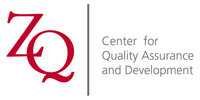The continuous monitoring of degree courses that forms part of the commitment to quality at Johannes Gutenberg University (JGU) includes a review of the workload. The tool developed by the Center for Quality Assurance and Development (ZQ) for recording the students' workload has two aims: on the one hand it determines the scope and apportionment of the students' workload, and on the other hand it investigates whether the empirically determined workload coincides with the calculated credit points for the event. Based on the results of this workload survey it is possible to analyze the quality of a degree course in respect of the workload for the students. At the same time, the results can provide the teaching staff with information as to whether it was possible to achieve the learning targets through the stipulated volume of work.
The student workload takes into account both classroom teaching and private study. Classroom teaching includes both attendance during courses and time for excursions and laboratory work. Private study consists of time for preparation and follow-up, for preparing papers and presentations, written work (including home work assignments and reports) and exam preparation. The student workload finds its way into the module handbooks for the degree courses through the determination of credit points.
The workload is recorded by means of a short survey that is completed by the students at the beginning of each event, and calculates the previous week's workload based on the course attended. During the last week of lectures, there is also a comparative survey in addition to the weekly survey, where the students estimate both their workload over the whole semester and the performance level compared with other events. There is also an entry survey and an online survey which record the workload during the lecture-free period.
The ZQ considers that the advantages of this procedure lie in the fact that representative results can be obtained from the course evaluations while keeping the costs and effort for the department to a minimum.
Lecturers are subsequently notified of results by e-mail and may use these for personal reflection on the respective course. Course representatives and course managers of the corresponding courses also receive a full report with the results for all courses.
Quantitative workload surveys at JGU, by Kerstin Burck, Katharina Heil, and Marcel Böhres Information on quantitative workload surveys
